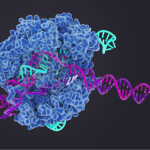In the latest round of intellectual property decisions from the US Patent & Trademark Office, Caribou Biosciences, co-founded by faculty scientist Jennifer Doudna, has been awarded intellectual property rights for CRISPR technology. The patent focuses on detecting areas in the genome that have been rearranged, versus genomic editing that would occur with the use of the associated Cas9 protein. CRISPR/Cas9 is a bacterial editing system that cuts and splices DNA sequences with unprecedented precision and speed and has become a technique used by scientists world-wide to study animal and plant cells. The patent dispute between the UC Regents and the Broad Institute was recently covered by the Los Angeles Times. More information about this recent decision can be found in The Daily Californian.
CRISPR/Cas9: Ready for Action
The CRISPR/Cas9 bacterial genomic editing system identifies and cleaves complementary target sequences in foreign DNA. CRISPR (clustered regularly interspaced short palindromic repeats)–associated (Cas) protein Cas9 begins its work by RNA-guided DNA unwinding to form an RNA-DNA hybrid and displacing a DNA strand inside the protein. Upon binding, Cas9 reorganizes into an R-loop complex that is necessary for it to perform its function. A recent article published in Science describes work done to uncover the structural basis of Cas9’s function.
Biosciences Area Scientists Participate in World Economic Forum
Faculty biochemist Jennifer Doudna and Biosciences Area Associate Laboratory Director Jay Keasling attended the World Economic Forum in Davos, Switzerland, last week, to bring their unique perspectives to world leaders. Both researchers were named to Al Aribya’s “45 top scientists at Davos you should know about” list.
Was this page useful?






